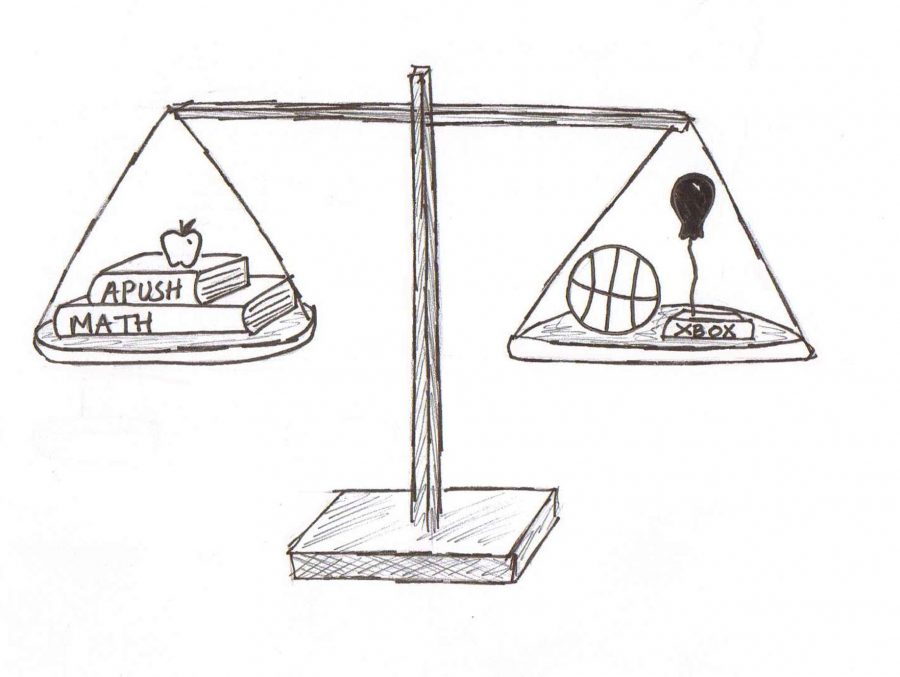Students learn to balance stress and free time
With the average hours of sleep declining and increasing homework expectations, many students find themselves battling stress on a daily basis. Students have to learn to work through the stress while maintaining a healthy lifestyle.
November 26, 2013
Stress and pressure are universal issues that any student may have to overcome. First take school, then add on sports and extracurricular activities, coaches, teachers and not to mention parents, and there is no way to not experience even the slightest bit of stress.
The amount of stress or pressure on a given student can have a wide variety of effects. But studies show in teenagers from the ages of 14-18 that their largest stress factors are in school, extracurricular activities, at home, through teachers, guardians and even coaches. All these have an impact of someone’s daily stress.
A textbook definition of stress is a state of mental or emotional strain or tension resulting from adverse or very demanding circumstances.
“[Stress occurs] when your life is out of balance,” said counselor Liz Nelson.
“Everyone’s definition will be different but I say it is when your environment and/or the people around you causes mental illness or tension to a certain person,” added sophomore Carly Fedorowski.
There are an endless supply of stress enablers, but one major caregiver is the amount of sleep a person gets a night. Say someone gets a healthy nine hours of rest, and another person had a rocky night and only had six hours; the person who got the nine hour rest already has a well start to their day and will be able to focus without the constant yawning and lethargicness.
Fedorowski said, “I go to sleep around 9:30 p.m. on good days and when I get up at 6:30 a.m. I’m not as tired as I am when I fall asleep at 11 p.m.”
Stress and pressure are caused by negative effects from a person’s surroundings or environment. Some examples are shown in your health, insomnia, productivity in work, feelings, behavior, and in serious conditions including heart disease.
Junior Matthew Treacy said, “When under a lot of pressure I notice that I get a slight cold, and feel like I have a headache all the time.”
Treacy added, “And once I have been under a lot of stress I get mad or frustrated at the smallest things.”
Nelson added, “[Negative effects of stress are] sleep deprivation, anxiety, depression and feeling overwhelmed.”
In the ages of 14-18 the largest stress producer is usually the stress of school. School takes up almost all of a students hours and also causes people to stay up later than usual, seen by the large amount of homework an average student has each night.
Treacy said, “When I get home from school I have at least 4 hours of homework and that is usually if there is a test the next day.”
From one student’s opinion, school should do something about the workload and find a way to lighten it.
Fedorowski said, “Schools should lessen the workload and start later for students to sleep in.”
Because students face so much pressure, they develop habits to deal with their stress.
Senior Kayla Tobias said, “Some ways I deal with my stress is when I get home I do my homework immediately to get that stress off of my shoulder, so then later I can relax and go to sleep earlier.”
The pressure on students to do good in school seems to be even higher today than ever before. There must be a way the schools can lessen this.
“We can help students make good choices while picking their courses for the year and help them choose the course that best suites them, and not be in such rigorous classes, ” said Nelson.
Students need to find a balance in their daily lives for some down time for themselves. They should find their route of stress and work with it. There are tons of ways to get past the overbearing of pressure, one must maintain a healthy balance.










Jordan Ehde • Nov 27, 2013 at 1:50 pm
This article was very well written. Students can really relate to it.
Tyler Malmberg • Nov 27, 2013 at 4:21 am
This is such a relatable story. Plenty of good information also.
Hannah Crawford • Nov 27, 2013 at 3:47 am
I love this story. It’s incredibly relevant and is full of useful information. The interviewees were knowledgeable and their quotes fit nicely into the story. The focus is clear and the story certainly gets it’s point across. Well done!
Lexie Sherrick • Nov 27, 2013 at 2:43 am
The lead pulls the reader in, because almost every high school student can relate to this article. It’s well written and has a good grasp on how to manage and balance life without stress.